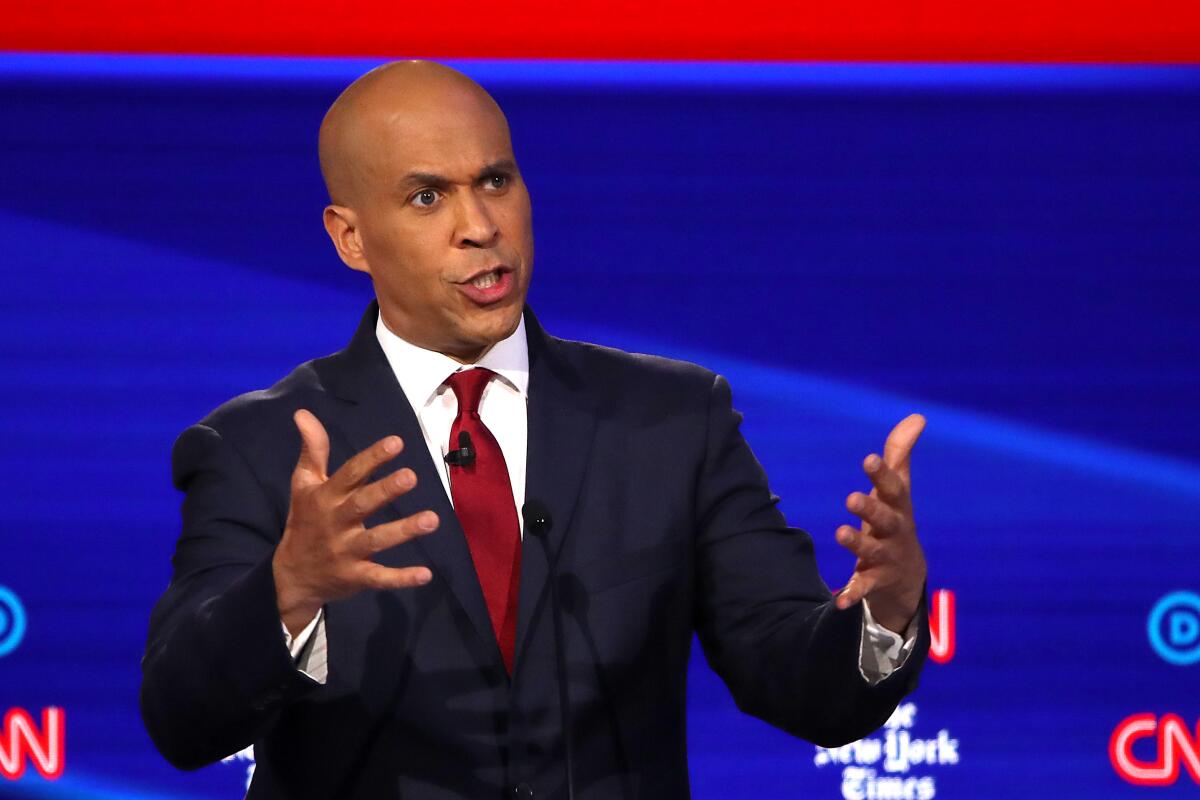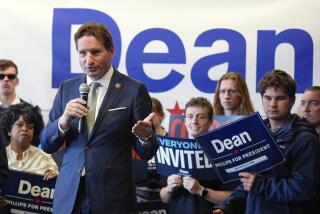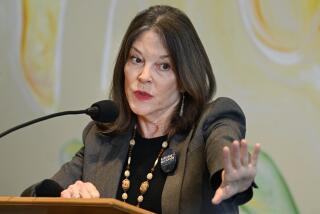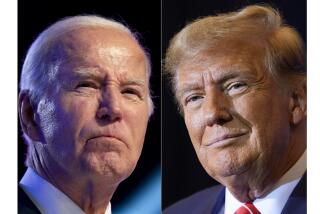Cory Booker quits presidential race, leaving an even more white Democratic field

Cory Booker brought a blend of uplifting eloquence and experience organizing on the streets to a candidacy that drew comparisons to Barack Obama’s, but neither quality could carry him into the top tier of the Democrats’ presidential race. Short on cash and floundering in the polls, Booker ended his White House bid on Monday.
“It’s with a full heart that I share this news — I’m suspending my campaign for president,” Booker tweeted. “To my team, supporters, and everyone who gave me a shot—thank you. I am so proud of what we built, and I feel nothing but faith in what we can accomplish together.”
The exit from the race by yet another prominent black lawmaker leaves what was once a historically diverse Democratic field of presidential candidates increasingly white and old. The remaining minority candidates in the race, only one of whom is African American, all face single-digit polling numbers with little time to break out of the pack before voting begins early next month.
That reality has sparked discomfort and soul-searching among party activists at a time when racial justice is central to the Democratic agenda and inspiring minority voters crucial to their hopes of retaking the White House. Three out of four of the top-tier candidates dominating the race are now whites in their 70s. Yet they have drawn significant minority support, especially former Vice President Joe Biden.
Although Booker drew praise for his oratorical skills and policy acumen, his brand of politics, which melded progressive policies with frequent calls for unity, seemed not to match the mood of either liberals or moderates.
Booker’s campaign theme of universal love — a promise to transcend dispiriting partisan politics and the harsh tone of the Trump era — didn’t catch fire with voters on the left who have flocked to Sens. Bernie Sanders and Elizabeth Warren, who both promise a fight. Centrist voters have moved toward Biden and South Bend, Ind., Mayor Pete Buttigieg, who offer more moderate policies and may appear less risky to some voters who fear a black candidate would lose to President Trump.
Biden’s strong support among black voters, especially older ones, also proved a significant stumbling block for Booker.
Booker brought to the race a storied biography as the mayor of Newark, N.J., who took up residence in the city’s housing projects and took down a corrupt administration in his path to City Hall — a quest captured in the critically acclaimed documentary “Street Fight.”
But in the current campaign, Booker’s life story competed with that of another black candidate in the race, California Sen. Kamala Harris, the child of immigrants from India and Jamaica who had hoped to become the first black woman president.
The New Jersey senator fell victim to some of the same strategic miscalculations as Harris, who dropped out of the race in early December.
They were both counting on their backgrounds and credentials in campaigns for racial justice to prove a big draw with minority voters in key states that vote early in the primary, particularly black voters in South Carolina. But they found themselves unable to dismantle the resilient coalition backing Biden. A newly released Washington Post-Ipsos poll found Booker was the first choice for just 4% of black Democrats nationwide, while 48% named Biden as their first choice.
Booker’s uneven record on progressive issues — which he tried to make a selling point, as a post-partisan candidate unencumbered by ideological barriers — instead proved a liability in this race. In a Democratic electorate that has become more starkly divided between progressives and moderates, it was never clear exactly where Booker fit.
“He’s had a hard time summing up his campaign succinctly to afford him some leverage in a race where there are so many candidates,” Dante Scala, a professor of political science at University of New Hampshire, said in an interview late last year. Scala said Buttigieg had largely usurped the mantle of the candidate offering something new and “is more of a true outsider than Booker now. Maybe years ago, coming as mayor of Newark, it would have been different.”
Booker’s embrace of charter schools while Newark mayor undermined his efforts to build support among teachers in Iowa and New Hampshire, an influential bloc in Democratic primaries. His past alliance with Facebook Chief Executive Mark Zuckerberg, who funded a major education initiative in Newark, also conflicted with the party’s more critical attitude toward big tech companies.
An unauthorized super PAC run by a former Stanford University classmate did not help Booker’s reformist cause. The group sought to raise money for Booker’s presidential bid even as the candidate pledged not to accept that kind of money. In the end, the super PAC didn’t raise enough money to help him much. It shut down in November.
Booker’s exit creates a reckoning for the Democratic Party. After Harris dropped out, he made the point that there were more billionaires than black candidates in the presidential race. On the debate stage, Booker emerged as a provocative voice on racial-justice issues, questioning whether the white candidates with ambitious plans on race issues have shown a commitment to fighting inequality that matched their talking points.
“The reality is that our primary process privileges white men above everyone else, at the expense of the party’s base,” said a statement from Steve Phillips, founder of the advocacy group Democracy in Color, who created the super PAC to support Booker.
Booker pilloried Biden in one debate for his role, as a senator, in promoting mass incarceration during the Clinton era. In another, he lit into Biden for hedging on marijuana legalization, forcefully lamenting how inequality in marijuana prosecution has destroyed black lives.
The only black candidate still in the running is former Massachusetts Gov. Deval Patrick, who entered the race late, is showing near-zero support in polls and seems unlikely to qualify for the Democratic debates.
The lack of racial diversity in the field comes at a time when Democratic Party leaders are desperate to energize minority voters. Had black voters turned out in 2016 at the rate they did when Obama was on the ticket, Democrats likely would not have lost the White House.
After Harris dropped out of the race on Dec. 3, Booker warned that the scarcity of nonwhite faces on the debate stage could doom Democratic efforts to spur a large minority turnout next fall. The warnings brought him a surge of donor support, his aides said at the time. But it wasn’t evident and his campaign remained on life support.
By Monday, with a depleted war chest and lacking any clear path to victory, Booker withdrew.
More to Read
Get the L.A. Times Politics newsletter
Deeply reported insights into legislation, politics and policy from Sacramento, Washington and beyond. In your inbox three times per week.
You may occasionally receive promotional content from the Los Angeles Times.







